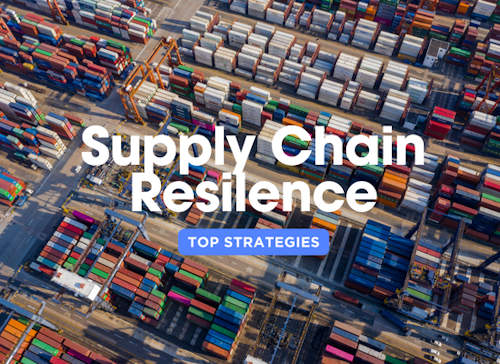Top Strategies for Supply Chain Resilience

In an increasingly interconnected and unpredictable global economy, the resilience of supply chains has become a critical focus for businesses across industries. The challenges posed by the COVID-19 pandemic, geopolitical tensions, and natural disasters have underscored the importance of building robust, adaptable, and resilient supply chains. As we move into 2025, companies are actively seeking strategies to fortify their supply networks against future disruptions.
1. Diversification of Suppliers and Sourcing Locations
Why It Matters: Relying on a single supplier or geographic region can expose businesses to significant risks, such as disruptions from natural disasters, political instability, or economic downturns.
Key Actions:
- Expand Supplier Base: Establish relationships with multiple suppliers in different regions to reduce dependency on a single source.
- Localize Critical Supplies: Consider sourcing critical components locally to minimize the risk of international supply chain disruptions.
- Regular Supplier Audits: Conduct periodic reviews and audits of supplier performance and reliability.
2. Investing in Advanced Technology and Digitalization
Why It Matters: Advanced technologies can enhance supply chain visibility, predict potential disruptions, and streamline operations.
Key Actions:
- Adopt AI and Machine Learning: Utilize AI and machine learning to analyze data and predict disruptions, enabling proactive measures.
- Implement IoT Devices: Use IoT devices to monitor and track inventory, shipments, and asset conditions in real-time.
- Leverage Blockchain: Incorporate blockchain technology for transparent and secure record-keeping of transactions and product movements.
3. Strengthening Inventory Management Practices
Why It Matters: Effective inventory management can help businesses respond quickly to disruptions and maintain product availability.
Key Actions:
- Optimize Inventory Levels: Balance inventory levels to avoid overstocking or stockouts, ensuring sufficient supply without excessive carrying costs.
- Use Just-In-Time (JIT) and Just-In-Case (JIC) Models: Combine JIT for efficiency with JIC for buffer stock to mitigate potential disruptions.
- Implement Demand Forecasting: Use advanced analytics to accurately forecast demand, allowing for better planning and inventory allocation.
4. Enhancing Supply Chain Transparency and Visibility
Why It Matters: Transparency across the supply chain allows for better monitoring and quicker responses to potential disruptions.
Key Actions:
- Real-Time Tracking: Implement systems for real-time tracking of goods, from production to delivery, to enhance visibility at every stage.
- Collaborative Platforms: Use collaborative platforms that enable seamless communication and information sharing among all supply chain partners.
- Data Sharing Agreements: Establish data sharing agreements with key suppliers and logistics providers to improve transparency and collaboration.
5. Building Stronger Relationships with Suppliers and Partners
Why It Matters: Strong relationships with suppliers and partners can lead to more collaborative and flexible supply chain arrangements.
Key Actions:
- Supplier Engagement Programs: Develop programs to engage suppliers, fostering loyalty and encouraging long-term partnerships.
- Joint Risk Management: Collaborate with suppliers to identify and mitigate potential risks in the supply chain.
- Contract Flexibility: Negotiate flexible contracts that allow for adjustments in response to changing market conditions or disruptions.
6. Investing in Workforce Training and Development
Why It Matters: A skilled and knowledgeable workforce is essential for managing and adapting to supply chain disruptions.
Key Actions:
- Training Programs: Implement regular training programs to keep staff updated on the latest supply chain management practices and technologies.
- Cross-Training: Encourage cross-training among employees to ensure they can cover multiple roles and responsibilities if needed.
- Leadership Development: Focus on developing leadership skills within the supply chain team to foster better decision-making and crisis management.
7. Implementing Agile and Flexible Supply Chain Models
Why It Matters: Agile and flexible supply chains can quickly adapt to changes in demand or disruptions, ensuring business continuity.
Key Actions:
- Agile Frameworks: Develop agile frameworks that allow for rapid decision-making and adjustments in supply chain processes.
- Flexible Contracts: Create flexible contracts with suppliers and logistics providers that accommodate changes in volume and delivery schedules.
- Modular Product Design: Use modular product designs to enable quick changes in production and assembly processes based on market demands.
8. Emphasizing Risk Management and Contingency Planning
Why It Matters: Effective risk management and contingency planning help businesses prepare for and respond to unexpected disruptions.
Key Actions:
- Risk Assessment: Conduct regular risk assessments to identify potential vulnerabilities in the supply chain.
- Business Continuity Plans: Develop and maintain business continuity plans that outline procedures for responding to various types of disruptions.
- Scenario Planning: Use scenario planning to anticipate and prepare for potential future challenges, such as geopolitical shifts or natural disasters.
9. Strengthening Logistics and Transportation Networks
Why It Matters: Reliable logistics and transportation networks are crucial for ensuring timely delivery of goods and maintaining supply chain flow.
Key Actions:
- Diversify Transportation Modes: Use a mix of transportation modes (e.g., air, sea, rail, road) to mitigate risks associated with any single mode.
- Strategic Warehousing: Invest in strategically located warehouses to reduce delivery times and provide flexibility in inventory management.
- Partnerships with Logistics Providers: Build strong partnerships with logistics providers to enhance service reliability and flexibility.
10. Focusing on Sustainability and Ethical Practices
Why It Matters: Sustainable and ethical supply chain practices are increasingly important to consumers, investors, and regulators.
Key Actions:
- Sustainable Sourcing: Prioritize sourcing materials and products from environmentally responsible and ethically sound suppliers.
- Carbon Footprint Reduction: Implement initiatives to reduce the carbon footprint of the supply chain, such as optimizing routes and using energy-efficient vehicles.
- Social Responsibility: Ensure fair labor practices and support initiatives that improve working conditions within the supply chain.
By implementing these strategies, businesses can build more resilient supply chains that are better prepared to handle disruptions and adapt to changing market conditions. Prioritizing agility, risk management, logistics strength, and sustainability will not only enhance resilience but also position companies for long-term success in a dynamic global economy.
Additional References
World Economic Forum (WEF) – Insights on supply chain resilience and global trade: https://www.weforum.org/agenda/archive/supply-chain-resilience/
International Trade Administration (ITA), U.S. Department of Commerce – Resources on global trade and supply chains: https://www.trade.gov/
The Resilient Supply Chain Benchmark (RSC-B) – A collaboration between MIT and the Council of Supply Chain Management Professionals (CSCMP): https://rsc-b.mit.edu/
OECD – Organisation for Economic Co-operation and Development – Reports and resources on trade and supply chain resilience: https://www.oecd.org/trade/topics/supply-chain-resilience/
Federal Emergency Management Agency (FEMA) – Guidelines and strategies for business continuity and supply chain resilience: https://www.fema.gov/
World Trade Organization (WTO) – Resources on global trade practices and policies: https://www.wto.org/
Supply Chain Management Review (SCMR) – Articles and research on supply chain trends and resilience: https://www.scmr.com/
International Chamber of Commerce (ICC) – Global trade and supply chain information: https://iccwbo.org/

Do you have a Maritime Product or Service that may be of interest to Shipowners? Tell us about it here!
Do you have feedback or insights? Please reach out to editor @ shipuniverse.com



